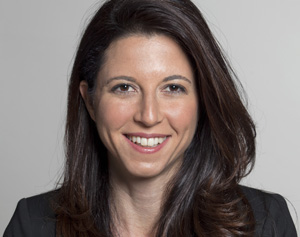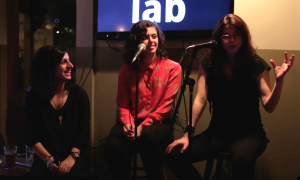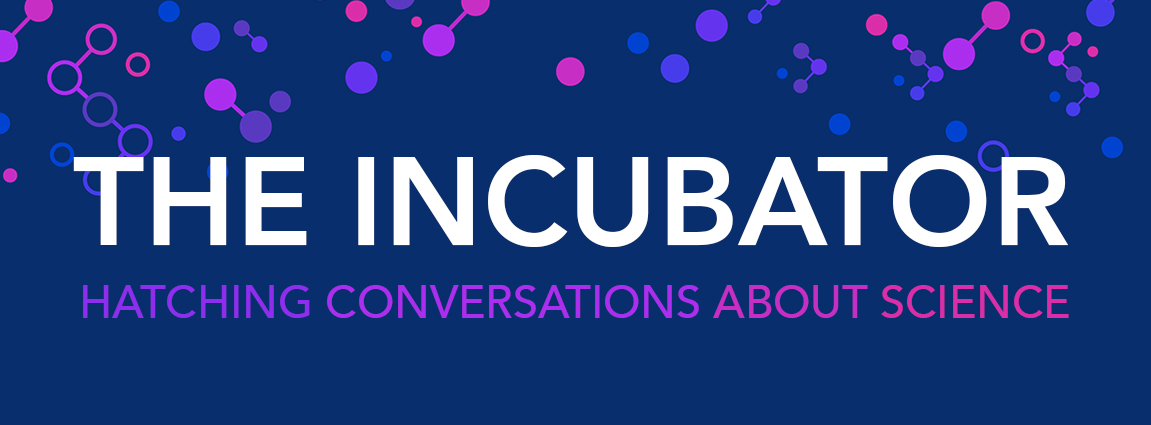Paths to Communication: Heather Berlin
A quick Google search of “science communication” will return a smattering of results ranging from hit television shows to community-based science outreach and education organizations. But what exactly could a career in science communication look like and how can we pursue one?
I’ve become familiar with science communicators and organizations doing really incredible work to get the general public engaged and excited about science. I’ve watched their videos, tuned in to their podcasts, and attended their events. They’ve inspired me with their passion and poise and filled my mind with ideas.
With that said, if science has taught me anything, it’s that the process is at least as important as the final product. To learn about their paths, from initial inspirations and lessons learned to plans for the future, I have begun to reach out to the science communicators I so admire. Another valuable lesson, courtesy of science, is that all my research would be for naught if I did not share it with my peers. For this reason, The Incubator has kindly carved out some space to feature Paths to Communication: a regular interview series with some stellar communicators of science.

Starting us off is Dr. Heather Berlin, a cognitive neuroscientist and Assistant Professor of Psychiatry and Neuroscience at the Icahn School of Medicine at Mount Sinai in New York where she uses neuroimaging techniques to better understand and improve treatment for impulsive and compulsive disorders. An avid science communicator, Heather is a presenter the Discovery Channel series Superhuman Showdown and has appeared on Neil deGrasse Tyson’s StarTalk Radio, the BBC World Service, and the History Channel among others . She has also shared her work with live audiences at local NY events including the Secret Science Club, Story Collider and Lucid NYC.
I first met Heather when she was a guest on my series, where she shared her expertise on the neural basis of consciousness and how it relates to our experiences at the movies. I was thoroughly impressed by her ability to fluidly field a broad range of questions and confidently own up to areas where science is still uncertain. Currently, she is developing a show for the Edinburgh Fringe Festival with science rapper Baba Brinkman, called “Off the Top,” that will explore the underlying neuroscience behind creativity and improvisation featuring performances by comedians and artists! In the interview below, Heather shares her experiences and insights into communicating science- from how to engage an audience to finding balance between the worlds of academia and communication.
So let’s start from the beginning. How did you find your way into science communication, and what are one or two of the most important lessons you’ve learned along your path?
I was fortunate enough to come across Bill Nye early in my career, who introduced me to Neil deGrasse Tyson. These were people who were both really successful in the field, whom I admired and tried to learn from them. They both gave me tips on how to communicate science, but both of them said there’s no clear path. There are certain things you can do to get more involved but, at the end of the day, you just have to go out there and do it yourself.
I started out giving traditional scientific talks at conferences, and I began to realize that I really enjoyed the presentation part of things. Of course, I enjoyed the research. But I got a sort of buzz from being able to present my work to other people. It ended up being great practice for me. A vital aspect of science communication is public speaking—knowing how to engage your audience and learning to recognize when they’re drifting off. And the same goes when you’re presenting your work to other academics. So I got better and better with the more opportunities I had to give public talks. I started to learn how to be engaging as a speaker—and that’s a really important skill whether you’re talking about science or anything else.
Over time, I started to get invited to speak to a more general audience. It took a while for me to gauge my talk and to present in a way that was true to the science, but not over people’s head—and to do that without “dumbing it down.” Finding that balance is so important. At the same time, you also have to be excited about the work yourself because that translates so that your enthusiasm inspires others. I think Neil deGrasse Tyson, for example, has this amazing way of getting people excited about the universe and astrophysics, whereas maybe they wouldn’t have been as enthusiastic about it otherwise. And for me, the brain is the most fascinating thing in the world- so how could you not want to understand it, or at least know more about it? I mean it’s everything you are!
What have you found to be the biggest challenge in making your work accessible to a general audience?
In the world of academia, it’s all about knowing a lot about very little. You become so ingrained in the details of your work. So the hardest part has been to pull back from the language of academia, which we’re so entrenched in—that very dry and detailed and technical language. So I have to make that shift in my mind to think about how to talk about very complex, detailed information in a way that’s going to be accessible to a general audience—and to do that while still imparting enthusiasm.
Some people can distill all that information into chunks that are digestible to a general audience. But if they’re really dry in their presentation, no one’s going to care. In today’s world you have information that’s coming at you quickly from all directions, so people will tune out very quickly if you’re dry in your presentation. So it’s not only about how to make the information accessible, but how to actually get people excited about it. You have to get people to first understand why it’s important for their lives, and once people tap into that, then they’re turned on.

How did you learn to walk that line to be more engaging when you’re presenting? What tips would you give to someone trying to build that skill?
I have a theater background, and I realized I could actually integrate those skills to capture an audience when giving an academic talk. So I started getting my groove on just giving lectures to fellow academics. As I went to more conferences, little by little I realized that the talks I’d go to that were presented in a very matter-of-fact way lost my attention. So I thought if I wanted to hold my audience’s attention, I should throw a joke in here and there or be more personable. As long as you’re getting the information across, no one says you have to be stodgy or dry. People react so much better when you just have a little bit of personality. So I started integrating that into my talks. I also found that I liked the question and answer period best because then I could kind of freestyle and go ‘off-script’, while I was learning to think quickly on my feet.
It’s also really helpful to critique yourself, especially if you can bear to watch yourself on tape. You learn to become hyperaware of things like where your body is in space and how you’re sounding. At the same time, when giving a talk you need to largely focus on the information you’re trying to convey, if you’re too self-conscious you’ll make mistakes. It’s also really great to have someone in the audience that you trust that can give you constructive feedback. So over time you just get better and better.
My biggest fear is always getting a question I just don’t know the answer to. How have you learned to deal with these sorts of questions—where you personally don’t know the answer or it’s just an open question in the field—while still maintaining your authority as a presenter or panelist?
I was just on The Agenda with Steve Paikin, who was doing a “Mysteries of the Mind” Week, for a show on the unconscious brain. One of the questions they asked me was about the best kind of psychiatric treatment—there’s psychotherapy, there’s pharmaceuticals, there’s deep brain stimulation. So I said, everyone’s an individual so it’s not an exact science, you try things out and see what works. You really have to tailor that treatment around that particular person and their particular biological make-up. So basically I admitted that psychiatry is both an art and a science. The more we know about the underlying genetics and neural basis of psychiatric illnesses, the better we will be able to develop more targeted treatments. But it’s still a trial and error kind of thing.
And it actually gives you a lot more confidence to admit that you don’t know enough if you’re doing public speaking. A lot of people are afraid to speak because they think, “What if they ask me something I don’t know?” But if you just admit that, it really frees you up. And it’s okay that you don’t know everything because you can’t know everything, and if you pretend that you do, people wouldn’t fully trust what you have to say.
In fact, admitting that you just don’t know the exact answer actually makes people more confident in what you’re saying. If you act so authoritative and like you have all the answers, people will be more skeptical. They’ll tend to want to find holes in your argument. So it’s ok to say “This is what we know so far, it’s trial and error, and we’re learning along the way.” That’s how science in general actually works! The whole point of the scientific method, and why it’s so great, is that it revises itself based on new information. If evidence knocks down a theory, scientists revise that theory.
So if ever you get questions like that, the thing is to emphasize is that’s why the scientific method is so great—because it allows us to continually gain knowledge in areas where we don’t know the answer, and it’s just an ongoing process. There’s never a point where you think: “That’s enough, now I’m done.” Even the ‘laws of physics’ can be modified if a new bit of information comes along!
You were just on a show called You’re the Expert! As scientists, we’re constantly searching for new questions and gaps in our knowledge, so it’s sometimes funny to acknowledge that we can actually be the expert or authority on something.
I remember when people started contacting me for my opinion or a quote on some topic, I just thought, “Wait a second, I’m the expert?” That whole concept was very strange and hard for me to understand. I kept thinking, “I’m not the expert, I’m just me!” But I gradually realized that I’ve been studying this one part of the human body for all these years and that you just can’t read all that information in a book in one day. At some point, it turns out that you are an expert, that this is as good as it gets. You have this pool of knowledge that you can draw from that not everybody has, all that built up experience and knowledge and the connections you’ve formed amongst all that information. So you are an expert in that sense, and that was something that took me a long time to get.
Based on your own experiences as both an academic and a science communicator, what advice would you give to someone like me, who is considering a career rooted in both worlds?
One problem in science communication is actually straddling the two worlds of academia and science communication. If you want to be really successful in academia, you have to have hundreds of high quality publications, and that takes a lot of time. So there’s unfortunately not a lot of time left over to pursue other interests. While there are some people who can ‘do it all’, if you want to pursue a career as a science communicator while remaining a research scientist, you might have to be willing to sacrifice some success in academia. You may have to be happy with saying, “I’m not going to have a huge lab so I can have time to do this other thing that I also really enjoy.” I’m still trying to find the right balance between engaging in first-rate scientific research and science communication – when I’ve figured it out I’ll let you know.
Dr. Berlin answering a question at an ArtLab event last December.
